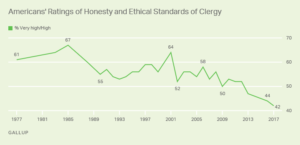Trust in experts and authority figures has taken a beating in the past decade. This is an ongoing cultural shift. This only becomes more significant when dealing with issues of morality and ethics, and church leaders bear the brunt of this shift. One Duke professor examines that most believe the individual conscience has a greater ability to determine sound ethical answers than do churches. This distrust has caused 60% of millennials to be politically independent.1
With the changing culture, the church isn’t doing itself any favors.
Scandals and corruption of church leadership are nothing new. But with social media, our awareness is heightened. Whether its sex scandals, accusations of plagiarism, abuse of power, or blatant hypocrisy, there is a constant hum of problems for church leadership.
Every year, trust in pastors decreases. Pastors are now seen as less trustworthy than judges (43%), daycare providers (46%), police officers (56%), pharmacists (62%), medical doctors (65%), grade school teachers (66%), military officers (71%), and nurses (82%). These numbers are steadily decreasing too.
These stats become particularly dire when looking at Christian vs non-Christians responses:
As a reminder, Paul lists the qualifications for pastors in 1 Timothy 3, and states that leaders be “above reproach,” “respectable,” and “well thought of by outsiders.” On a cultural level, we’re failing.
I am sympathetic to our culture that may read “Obey your leaders and submit to them” (Heb 13:17) and shake their heads. Trust has been lost, but trust can be won again. Pastors, fight to live above reproach. Have people who know your real struggles. Fight against the desire for celebrity pastor status.
Why do you think its such a struggle to trust church leadership?
- http://indianexpress.com/article/lifestyle/life-style/most-american-millennials-are-politically-independent-study-3020888/



